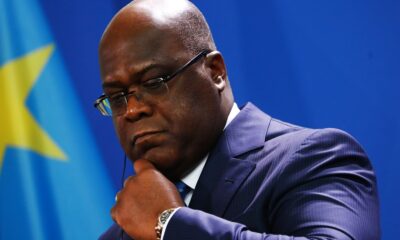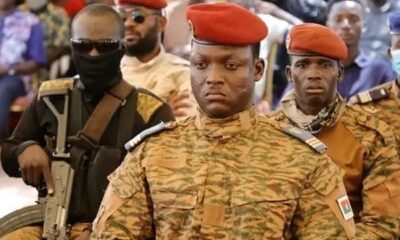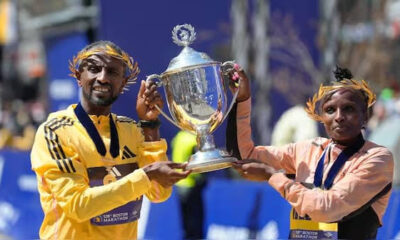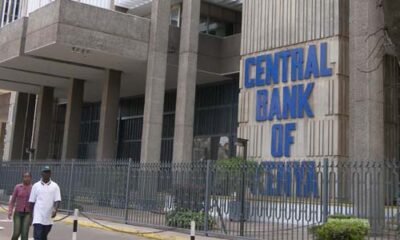Strictly Personal
Tobi Amusan, Ozuah And Buhari’s N1.14bn Vehicles For Niger by Festus Adebayo
Published
2 years agoon

To understand the profligacy, indiscretion and misplaced priority in the purchase of N1.14bn ($2.7m)-worth 10 luxury vehicles by the MuhammaduBuhari government for neighbouring Niger Republic, ostensibly to shore up that country’s security, at a time when there is excruciating hunger in the land and terrorists are probably a mile away from the Aso Villa seat of government, you have to go way back to the year 1972 or so, to the reply of the late President of Niger Republic, AhmaduDiori, when asked why Niger supported Nigeria as against the secessionist Biafrain the Nigerian Civil War. According to Diori, as quoted by Temitope Ola in ‘Nigeria’s assistance to African states: What are the benefits?’ in International Journal of Development and Sustainability, Niger depended on Nigeria for her economic survival. In his direct words, made in French, Diori had said “when Nigeria sneezes, Niger not only catches cold, it is already on admission in the hospital.”
While government justifies the vehicle purchase as continuation of Nigeria’s national foreign policy, with its central focus on Africa, this has afforded Nigerians the opportunity to dig into the details of the so-called foreign policy. In the process, we found out that, as irresponsibly profligate as that Buhari government’s vehicle purchase is, at this time of national economic pains at home, profligacy and irresponsible spending have, since independence, hallmarked successive Nigerian governments’ national and foreign policies. This recklessness confirms the flipside of that popular aphorism that though Rome was not built in a day, Rome was also not destroyed in a day as well. Not only didn’t the prostrate and lamentable state that Nigeria currently finds herself begin today, Buhari, a known defender of his Fulani ethnicity, at the expense of Nigeria, was led into taking such a reprehensible action based on a Nigerian governmental pedigree of wastage.
According to a January 30, 1970 edition of The New York Times, even after a ruinous, brutal and destructive civil war, Nigeria’s economic structure and promise remained almost unscathed. Put at about $1billion spent on prosecuting the needless civil war, Nigeria must have been one of the few countries in the world which fought an intra-national war for three years without any known record of indebtedness. With an economy managed by Chief ObafemiAwolowo, an astute manager of men and resources, Times reported that Nigeria adopted the “cash and carry” method for her arms and ammunition procurement. More astoundingly, she didn’t have to draw down on her foreign currency reserves which, pre-war, stood at $400 million.
Armed with a hugely humongous oil wealth, a vast population and the mantra that a Nigerian was in five blacks gathered anywhere in the world, as the street lingo says, these soon “entered Nigeria’s head,” and the thought that the country could be an African superpower became a near-national ideological obsession. Between 1967 and 1977, federal government revenue was said to have soared by 2,200 per cent. Nigeria’s economy was so strong that, on January 1, 1973, the country abandoned its pound sterling currency, a colonial relic, and created a Naira currency. Nigeria was managed by an exuberant crop of unaccountable military leaders who had scant leadership and economic training. The height of it was Gowon’s infamous statement abroad in 1973 that Nigeria’s problem was not money but how to spend it. The huge oil wealth was soon quashed on the altar of naivety, arrogance and knavery.
Going on foreign junkets became a pastime of the nouveau riche military elite and a consumerist pattern driven by obsession for foreign goods. This grossly contradicted a budding ideology of a people who professed African superpower. General Gowon, like MuhammaduBuhari, publicly known for his terse thirst for personal corruption, became a breeding pond for blood-of-the-country-sucking sharks dressed in military epaulettes. The governors began a mania of infrastructure driven more by opportunistic crave to collect kickback from contractors than need for development. It became so bad that in 1975, the Gowon government had placed accumulated order for 20 million tonnes of cement, paid for by Nigeria’s buoyant petro-dollars. The cost of the mind-boggling cement orders was put at about $2 billion, an amount which was a quarter of Nigeria’s oil revenue in 1975. This order was at the time more than the cement capacity of Europe and USSR combined. Apapa was thoroughly overwhelmed and shipping lines all over the world scurried to Nigeria to take a bite of the raw, mindless orgy of profligacy. Most of the shipments entered demurrage in what was infamously dubbed the Cement Armada.
The petro-dollar El-Dorado was so hugely provoked that every rural dweller in Nigerian villages wanted to migrate to the city. Prostitution statistics rose tremendously, so did crimes. Girls became willing liaisons to soldiers in whose hands hid the famous dollars from oil exploration and their civil servant accomplices. Between 1970 and 1976, statistics revealed an upsurge in criminal activities due to the craze to take a bite of petro-dollars. An approximate 900-percent increase in incidences of armed robbery was recorded, with 12,153 reported cases in 1970. This figure soared to 105,859 in 1976. Executions of robbers, codified in federal and state laws, went on the upswing. The capital punishment for armed robbery could however not deter the spate of robberies because the petro-dollar gains accruable from the crime outweighed the risk of being caught.
It was easy for the exuberant military leaders, many of them in their 20s and 30s, some of whom were bachelors, like General Jack, the Head of State himself, to extend the spatial control mentality of military psychology into governance. They easily keyed into the African superpower near-national ideological obsession and began to spend like Father Christmas, in the service of a foreign policy they devised, which was woven round Africa as centre-piece. This cost Nigeria heavily.
Thus, in 1972, as reported by Ola, Nigeria signed a pact with Niger Republic to supply her 30,000 kilowatts of electricity, from the Kanji Dam hydroelectricity, even when local electricity needs were not met. Again in 1974, Nigeria donated millions of Naira-worth relief materials to same Niger when it was ravaged by drought. After the widespread Soweto massacre riots of 1976, Nigeria brought into the country hundreds of “Soweto kids” and several other South African Black youths and offered them scholarship to study in Nigerian universities. This continued to the end of apartheid. Nigeria also established a South Africa Relief Fund (SARF) in 1978 where Nigerians poured about $20 million of their hard-earned money into. In June 1976, according to Ola, Gen Obasanjo presented a cheque of $250,000 to the liberation forces of Rhodesia through Mozambiquan Foreign Minister, Joaquim Chissano in Mauritius during the OAU summit. Quoting General Joe Garba, Ola also reported that, on April 25, 1976, Obasanjo handed over to President Samora Machel of the newly independent state of Mozambique the sum of $1.6 million as development assistance.
Nigeria also did this Father Christmas in her negotiation with and sale of a concessionary 90-day crude oil to South Africa, Namibia, Ghana, Niger and other Africa countries. Ghana and Togo owed the country over $30million from the exercise. The Big Father Xmas also constructed an expressway from Lagos to the outskirts of Cotonou with several millions of dollars, while spearheading the integration project of a regional gas pipeline for the sub-regional economic development. Nigeria equally established the Technical Aid Programme and created a Trust Fund at AfDB for Africans with a soft loan of $100 million it left in the bank to be lent to Least Developing African Countries.
In 1989, upon the paralysis of Beninoise government by a bludgeoning workers’ strike occasioned by its inability to pay salaries, Nigeria, under Babangida, offset the salaries while also donating 12,000 tonnes of petroleum products to the government. The year before, Babangida’s Nigeria funded the Ibrahim Babangida School of International Studies in Liberia and donated seven Nigerian academics to its institution while Nigeria constructed the Trans-African Highway and bought over Liberia’s debt valued at $30 million.
There have been several arguments from international relations scholars who aver that, not being an island unto herself, Nigeria cannot but assist other nations, especially the ones that surround her. This argument is further bolstered by the fact that Nigeria herself receives huge assistances from developed countries of the world. However, Nigeria’s foreign policy has been left so much to the whims of the executive arm of government which then drives it according to the personal mindset of the head of the arm. It is why a cronyist like Buhari will capitalize on this unwholesome pedigree of Nigerian leadership to fritter money abroad in building a road into his Niger ancestral home, spend billions of Nigerian money on the tiny African country and legitimize it by citing Nigeria’s national foreign policy. President Obasanjo and General Babangida, for instance, squandered Nigeria’s national wealth so unconscionably during their stay in office on what will appear a mythical brotherhood relations policy, without corresponding benefits accruable to the country. Many of those countries on whom Nigeria squandered her national resources that could have been saved to build a today for her children demonize Nigeria and Nigerians today on account of the social and economic calamities that result, partly from such mindless donations and investments in their countries that were made decades ago. Nigerians today face xenophobic attacks from South Africans, for whose today we cleaned our treasury yesterday.
Almost as if it was perforating the thesis I have been sermonizing about since the beginning of this piece, on the scene emerged an alumnus of the College of Medicine, University of Ibadan, MBBS Class of 1985, Dr Philip Ozuah who donated the sum of $1,000,000 to a hostel building fund project of the college last week. The news nearly blocked the social media airwave. In an earlier discussion of Nigeria’s Father Christmas role in Africa that I had with some persons, I was asked that, put beside Ozuah’s gesture, what difference exists between Nigeria and Dr. Ozuah, both having helped their needy ecosystem?
In some way, you could also throw into this mix Nigeria’s Tobi Amusan, the 25-year old athlete who made history last week by winningthe 100 metres hurdles gold at the World Athletics Championship.
Rather than counterpoise or equalize Nigeria, I think what both Ozuah and Amusan did for Nigeria is what Leo Tolstoy called Loss as the elder brother of Gain. At a time, we thought our Loss was the national morale that had sagged badly in Nigeria, both in individual Nigerians’ willingness to intervene in the affairs of the other person or intervention in matters that affect the collective. Also, at a time that we thought that the name of Nigeria could never inspire anything good in the world, Amusan and Ozuah dismantled this mindset by coming as our Gain. In the words of Bob Marley, in his Trenchtowntrack, Ozuah and Amusan both made Nigeria/Nigerians to find “our (national) bread in desolate places,” among a world that asked, “can anything good come out Of (Nigeria) Trench Town?”
However, Ozuah and Amusan haven’t totally erased the fact that Nigeria is still a desolate place. If you listened to the maiden Channels TV interview granted by Festus Keyamo, National Publicity Secretary of the APC and his haughty pee on the graves of Nigerians who died and are still dying as a result of Buhari’s effeminate fight of terrorists, or his cavalier dismissal as inconsequential and the over-simplification of the almost half a year stay at home by our university children, you cannot but conclude that though brains similar to Keyamo’s, since 1960, have profligately driven Nigeria back, the Amusan and Ozuahs demonstrate that even inside the tunnel, we can have the light shine.
You may like
-


Air Peace, capitalism and national interest, By Dakuku Peterside
-


This is chaos, not governance, and we must stop it, By Tee Ngugi
-


Off we go again with public shows, humbug and clowning, By Jenerali Uliwengu
-


How patriarchy underpins gender violence today, By Tee Ngugi
-


Help! There’s a dangerous, secret plot to save the EAC from imminent death, By Charles Onyango-Obbo
-


How South Africa, US elections could shape Tshisekedi’s bread in Kinshasa, By Charles Onyango-Obbo
Strictly Personal
Air Peace, capitalism and national interest, By Dakuku Peterside
Published
2 days agoon
April 16, 2024
Nigerian corporate influence and that of the West continue to collide. The rationale is straightforward: whereas corporate activity in Europe and America is part of their larger local and foreign policy engagement, privately owned enterprises in Nigeria or commercial interests are not part of Nigeria’s foreign policy ecosystem, neither is there a strong culture of government support for privately owned enterprises’ expansion locally and internationally.
The relationship between Nigerian businesses and foreign policy is important to the national interest. When backing domestic Nigerian companies to compete on a worldwide scale, the government should see it as a lever to drive foreign policy, and national strategic interest, promote trade, enhance national security considerations, and minimize distortion in the domestic market as the foreign airlines were doing, boost GDP, create employment opportunities, and optimize corporate returns for the firms.
Admitted nations do not always interfere directly in their companies’ business and commercial dealings, and there are always exceptions. I can cite two areas of exception: military sales by companies because of their strategic implications and are, therefore, part of foreign and diplomatic policy and processes. The second is where the products or routes of a company have implications for foreign policy. Air Peace falls into the second category in the Lagos – London route.
Two events demonstrate an emerging trend that, if not checked, will disincentivize Nigerian firms from competing in the global marketplace. There are other notable examples, but I am using these two examples because they are very recent and ongoing, and they are typological representations of the need for Nigerian government backing and support for local companies that are playing in a very competitive international market dominated by big foreign companies whose governments are using all forms of foreign policies and diplomacy to support and sustain.
The first is Air Peace. It is the only Nigerian-owned aviation company playing globally and checkmating the dominance of foreign airlines. The most recent advance is the commencement of flights on the Lagos – London route. In Nigeria, foreign airlines are well-established and accustomed to a lack of rivalry, yet a free-market economy depends on the existence of competition. Nigeria has significantly larger airline profits per passenger than other comparable African nations. Insufficient competition has resulted in high ticket costs and poor service quality. It is precisely this jinx that Air Peace is attempting to break.
On March 30, 2024, Air Peace reciprocated the lopsided Bilateral Air Service Agreement, BASA, between Nigeria and the United Kingdom when the local airline began direct flight operations from Lagos to Gatwick Airport in London. This elicited several reactions from foreign airlines backed by their various sovereigns because of their strategic interest. A critical response is the commencement of a price war. Before the Air Peace entry, the price of international flight tickets on the Lagos-London route had soared to as much as N3.5 million for the economy ticket. However, after Air Peace introduced a return economy class ticket priced at N1.2 million, foreign carriers like British Airways, Virgin Atlantic, and Qatar Airways reduced their fares significantly to remain competitive.
In a price war, there is little the government can do. In an open-market competitive situation such as this, our government must not act in a manner that suggests it is antagonistic to foreign players and competitors. There must be an appearance of a level playing field. However, government owes Air Peace protection against foreign competitors backed by their home governments. This is in the overall interest of the Nigerian consumer of goods and services. Competition history in the airspace works where the Consumer Protection Authority in the host country is active. This is almost absent in Nigeria and it is a reason why foreign airlines have been arbitrary in pricing their tickets. Nigerian consumers are often at the mercy of these foreign firms who lack any vista of patriotism and are more inclined to protect the national interest of their governments and countries.
It would not be too much to expect Nigerian companies playing globally to benefit from the protection of the Nigerian government to limit influence peddling by foreign-owned companies. The success of Air Peace should enable a more competitive and sustainable market, allowing domestic players to grow their network and propel Nigeria to the forefront of international aviation.
The second is Proforce, a Nigerian-owned military hardware manufacturing firm active in Rwanda, Chad, Mali, Ghana, Niger, Burkina Faso, and South Sudan. Despite the growing capacity of Proforce in military hardware manufacturing, Nigeria entered two lopsided arrangements with two UAE firms to supply military equipment worth billions of dollars , respectively. Both deals are backed by the UAE government but executed by UAE firms.
These deals on a more extensive web are not unconnected with UAE’s national strategic interest. In pursuit of its strategic national interest, India is pushing Indian firms to supply military equipment to Nigeria. The Nigerian defence equipment market has seen weaker indigenous competitors driven out due to the combination of local manufacturers’ lack of competitive capacity and government patronage of Asian, European, and US firms in the defence equipment manufacturing sector. This is a misnomer and needs to be corrected.
Not only should our government be the primary customer of this firm if its products meet international standards, but it should also support and protect it from the harsh competitive realities of a challenging but strategic market directly linked to our national military procurement ecosystem. The ability to produce military hardware locally is significant to our defence strategy.
This firm and similar companies playing in this strategic defence area must be considered strategic and have a considerable place in Nigeria’s foreign policy calculations. Protecting Nigeria’s interests is the primary reason for our engagement in global diplomacy. The government must deliberately balance national interest with capacity and competence in military hardware purchases. It will not be too much to ask these foreign firms to partner with local companies so we can embed the technology transfer advantages.
Our government must create an environment that enables our local companies to compete globally and ply their trades in various countries. It should be part of the government’s overall economic, strategic growth agenda to identify areas or sectors in which Nigerian companies have a competitive advantage, especially in the sub-region and across Africa and support the companies in these sectors to advance and grow to dominate in the African region with a view to competing globally. Government support in the form of incentives such as competitive grants ,tax credit for consumers ,low-interest capital, patronage, G2G business, operational support, and diplomatic lobbying, amongst others, will alter the competitive landscape. Governments and key government agencies in the west retain the services of lobbying firms in pursuit of its strategic interest.
Nigerian firms’ competitiveness on a global scale can only be enhanced by the support of the Nigerian government. Foreign policy interests should be a key driver of Nigerian trade agreements. How does the Nigerian government support private companies to grow and compete globally? Is it intentionally mapping out growth areas and creating opportunities for Nigerian firms to maximize their potential? Is the government at the domestic level removing bottlenecks and impediments to private company growth, allowing a level playing field for these companies to compete with international companies?
Why is the government patronising foreign firms against local firms if their products are of similar value? Why are Nigerian consumers left to the hands of international companies in some sectors without the government actively supporting the growth of local firms to compete in those sectors? These questions merit honest answers. Nigerian national interest must be the driving factor for our foreign policies, which must cover the private sector, just as is the case with most developed countries. The new global capitalism is not a product of accident or chance; the government has choreographed and shaped it by using foreign policies to support and protect local firms competing globally. Nigeria must learn to do the same to build a strong economy with more jobs.
Strictly Personal
This is chaos, not governance, and we must stop it, By Tee Ngugi
Published
1 week agoon
April 10, 2024
The following are stories that have dominated mainstream media in recent times. Fake fertiliser and attempts by powerful politicians to kill the story. A nation of bribes, government ministries and corporations where the vice is so routine that it has the semblance of policy. Irregular spending of billions in Nairobi County.
Billions are spent in all countries on domestic and foreign travel. Grabbing of land belonging to state corporations, was a scam reminiscent of the Kanu era when even public toilets would be grabbed. Crisis in the health and education sectors.
Tribalism in hiring for state jobs. Return of construction in riparian lands and natural waterways. Relocation of major businesses because of high cost of power and heavy taxation. A tax regime that is so punitive, it squeezes life out of small businesses. Etc, ad nauseam.
To be fair, these stories of thievery, mismanagement, negligence, incompetence and greed have been present in all administrations since independence.
However, instead of the cynically-named “mama mboga” government reversing this gradual slide towards state failure, it is fuelling it.
Alternately, it’s campaigning for 2027 or gallivanting all over the world, evoking the legend of Emperor Nero playing the violin as Rome burned.
A government is run based on strict adherence to policies and laws. It appoints the most competent personnel, irrespective of tribe, to run efficient departments which have clear-cut goals.
It aligns education to its national vision. Its strategies to achieve food security should be driven by the best brains and guided by innovative policies. It enacts policies that attract investment and incentivize building of businesses. It treats any kind of thievery or negligence as sabotage.
Government is not a political party. Government officials should have nothing to do with political party matters. They should be so engaged in their government duties that they literally would not have time for party issues. Government jobs should not be used to reward girlfriends and cronies.
Government is exhausting work undertaken because of a passion to transform lives, not for the trappings of power. Government is not endless campaigning to win the next election. To his credit, Mwai Kibaki left party matters alone until he had to run for re-election.
We have corrupted the meaning of government. We have parliamentarians beholden to their tribes, not to ideas.
We have incompetent and corrupt judges. We have a civil service where you bribe to be served. Police take bribes to allow death traps on our roads. We have urban planners who plan nothing except how to line their pockets. We have regulatory agencies that regulate nothing, including the intake of their fat stomachs.
We have advisers who advise on which tenders should go to whom. There is no central organising ethos at the heart of government. There is no sense of national purpose. We have flurries of national activities, policies, legislation, appointments which don’t lead to meaningful growth. We just run on the same spot.
Tee Ngugi is a Nairobi-based political commentator
EDITOR’S PICK


Top European, Asian clubs on alert as Super Eagles keeper set to make contract decision
Some top clubs in Europe and Asia have been put on alert as Super Eagles and Chippa United goalkeeper, Stanley...


IMF says South Africa needs to do more to cut spending, lower debt-to-GDP ratio
A top official from the International Monetary Fund has revealed that South Africa needs to do more to cut spending...


Burkina Faso expels 3 French diplomats over ‘subversive activities’
According to a letter quoted by Reuters on Thursday, three French diplomats have been sent back to France by Burkina...


Nigeria’s MAX partners Ghana’s Kofa in e-bike financing deal
Nigeria’s electric vehicle solutions provider, MAX, has announced striking a partnership deal with Ghana’s innovator in energy networks, Kofa, that...


Zambia asks EU to help strengthen its democratic initiatives ahead of 2026 elections
The Zambian government has called on the European Union (EU) to help in strengthening democratic initiatives in the country as...


Nigeria destined to become major global economy under Tinubu— VP Shettima
Nigeria’s Vice President, Kashim Shettima, has predicted that the country is destined to become a major economic force in the...


Nigeria’s central bank insists depleting external reserves not due to Naira defence
According to the Central Bank of Nigeria (CBN), the big drop in the country’s foreign exchange reserves was not due...


African Guarantee Fund partners Nordic Development Fund to launch green finance in Nigeria
The African Guarantee Fund (AGF) has teamed up with the Nordic Development Fund (NDF) to launch a green finance fund...


Ethiopia’s Lemma, Kenya’s Obiri give Africa double podium finish at Boston Marathon
Ethiopia’s long distance runner, Sisay Lemma, and Kenyan female marathon sensation, Hellen Obiri, teamed up to give Africa a double...


Davido’s ‘Unavailable’ achieves milestone with 100 million views on YouTube, Spotify
Nigeria’s Afrobeats sensation, David Adeleke, popularly known as Davido, has landed another milestone after his hit single, “Unavailable’, surpassed 100...
Trending
-

 Sports2 days ago
Sports2 days agoEthiopia’s Lemma, Kenya’s Obiri give Africa double podium finish at Boston Marathon
-

 Metro2 days ago
Metro2 days agoZambia: Many feared injured as UPND, PF supporters clash in court
-

 Culture2 days ago
Culture2 days agoDavido’s ‘Unavailable’ achieves milestone with 100 million views on YouTube, Spotify
-

 VenturesNow2 days ago
VenturesNow2 days agoInvestors’ wealth drops by $968 million on Nairobi Securities Exchange


